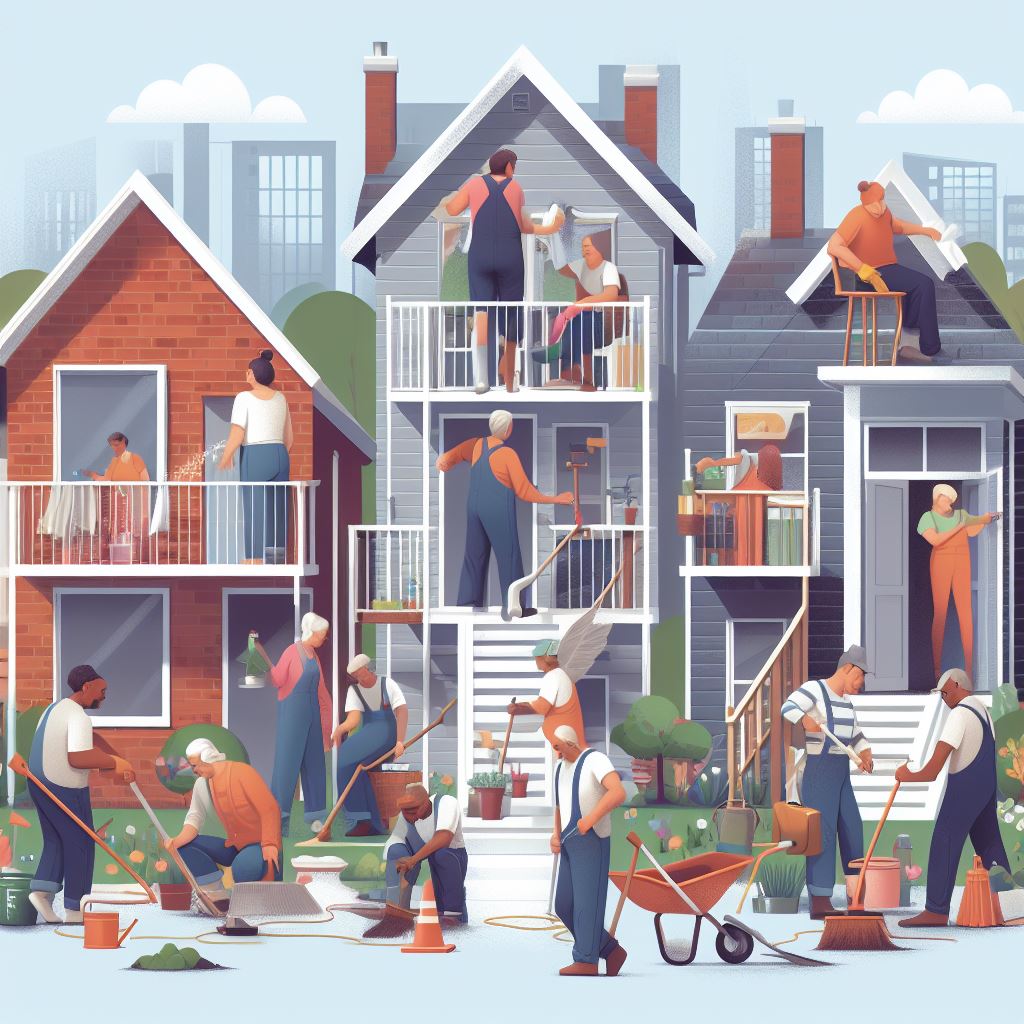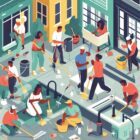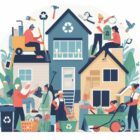Unveiling Tenant Maintenance Duties in Subsidized Homes

Are you aware of your duties as a tenant in subsidized homes? It’s time to unveil the responsibilities that come with living in these affordable housing options.
Maintaining a clean living space, reporting repairs and maintenance issues, and complying with safety regulations are all part of your role. Effective communication with landlords and property managers is essential.
By understanding and fulfilling these duties, you can ensure a comfortable and well-maintained living environment for yourself and your neighbors.
Key Takeaways
- Tenants in subsidized homes have the responsibility to maintain a clean and tidy living space.
- Reporting maintenance issues promptly is crucial for the safety and habitability of the home.
- Compliance with safety regulations, such as regular inspections and functioning smoke detectors, is essential.
- Effective communication with landlords and property managers is important to address any issues and find satisfactory solutions.
Understanding Tenant Responsibilities
As a tenant in a subsidized home, it’s crucial for you to understand your maintenance responsibilities. Knowing what’s expected of you won’t only help you maintain a safe and comfortable living environment, but it will also contribute to the overall upkeep of the community.
First and foremost, you’re responsible for keeping your unit clean and tidy. This includes regular cleaning of floors, countertops, and appliances. It’s also important to promptly report any maintenance issues to the property management office. This could range from a leaking faucet to a broken window. By reporting these issues promptly, you’re helping to prevent further damage and ensuring a timely resolution.
Additionally, as a tenant, you’re responsible for the proper disposal of trash and recycling. This means using the designated bins and following any recycling guidelines set by the management. By properly disposing of waste, you’re contributing to a clean and environmentally friendly community.
Lastly, it’s important to respect the property and common areas. This means not causing any intentional damage and being mindful of noise levels and cleanliness in shared spaces.
Maintaining a Clean Living Space
To maintain a clean living space in your subsidized home, prioritize regular cleaning and proper disposal of waste. Keeping your home clean not only promotes a healthy living environment but also helps preserve the condition of the property. Here are three essential tasks to consider:
- Regular cleaning: Set aside time each week to clean the different areas of your home. Dust surfaces, vacuum floors, and mop hard surfaces to remove dirt and allergens. Clean kitchen appliances, sinks, and countertops to prevent the buildup of bacteria. Don’t forget to clean the bathroom regularly to maintain hygiene.
- Proper waste disposal: Dispose of waste in the designated bins or containers provided. Separate recyclable materials from general waste and place them in the appropriate recycling bins. Keep garbage bins covered to prevent pests and odors.
- Cleaning up spills and stains promptly: Accidents happen, but it’s important to clean up spills and stains promptly to avoid permanent damage to surfaces or attracting pests. Use appropriate cleaning products and techniques for different types of spills and stains.
Reporting Repairs and Maintenance Issues
If you encounter any repairs or maintenance issues in your subsidized home, promptly report them to the appropriate authority. Reporting repairs and maintenance issues in a timely manner is crucial for ensuring the safety and habitability of your home. By promptly reporting these issues, you can help prevent further damage and potential hazards.
To help you understand the process better, here is a table outlining the steps to report repairs and maintenance issues:
| Step | Action | Description |
|---|---|---|
| 1 | Identify the issue | Take note of any repairs or maintenance problems that need attention. |
| 2 | Contact the appropriate authority | Reach out to the designated personnel, such as the property manager or maintenance staff, to report the issue. |
| 3 | Provide necessary information | Clearly describe the problem and provide any relevant details, such as the location and severity of the issue. |
Complying With Safety Regulations
How can you ensure that you’re complying with safety regulations in your subsidized home? It’s crucial to prioritize the safety of yourself and others by following the necessary guidelines. Here are three key points to help you comply with safety regulations:
- Regular Inspections: Conduct regular inspections of your subsidized home to identify any potential safety hazards. Check for faulty electrical outlets, loose handrails, or any other potential risks. Report any issues to the appropriate authorities immediately.
- Smoke and Carbon Monoxide Detectors: Ensure that your subsidized home is equipped with functioning smoke and carbon monoxide detectors. Test them regularly to make sure they’re in proper working condition. Replace the batteries as needed, and report any malfunctions to the maintenance staff.
- Fire Safety Measures: Familiarize yourself with the fire safety measures in your subsidized home. Know the location of fire extinguishers, emergency exits, and fire alarms. Follow the established evacuation plan in case of a fire emergency. Regularly review and update your knowledge of fire safety procedures.
Communicating With Landlords and Property Managers
When communicating with landlords and property managers in your subsidized home, it’s important to maintain open lines of communication for prompt resolution of maintenance issues. Effective communication ensures that any concerns or problems you may have are addressed in a timely manner, allowing for a comfortable living environment.
It’s recommended to establish a clear and direct line of communication with your landlord or property manager, whether through email, phone calls, or in-person meetings. Clearly articulate the issue you’re facing, providing specific details and any supporting documentation if necessary. This will help the landlord or property manager understand the severity and urgency of the problem.
Additionally, it’s crucial to maintain a respectful and professional tone when communicating with them. Avoid using aggressive or confrontational language, as this may hinder the resolution process. Be open to hearing their perspective and suggestions for resolving the issue, and work together to find a solution that’s satisfactory for both parties.
Frequently Asked Questions
How Can Tenants Ensure the Safety of Their Home Without Violating Any Regulations?
You can ensure the safety of your home without violating regulations by regularly inspecting and maintaining your property. This includes checking for fire hazards, addressing plumbing issues, and reporting any necessary repairs to your landlord.
What Steps Should Tenants Take if They Witness a Maintenance Issue in a Common Area of the Subsidized Housing Complex?
If you witness a maintenance issue in a common area of your subsidized housing complex, immediately report it to the property manager or maintenance staff. They are responsible for resolving such issues and ensuring the safety of the residents.
Are There Any Specific Guidelines for Tenants Regarding the Disposal of Hazardous Waste or Chemicals?
Are there specific guidelines for tenants regarding the disposal of hazardous waste or chemicals? Yes, there are guidelines in place to ensure the safe disposal of these materials. It is important for tenants to follow these guidelines to protect themselves and the environment.
What Happens if a Tenant Fails to Report a Repair or Maintenance Issue in a Timely Manner?
If you fail to report a repair or maintenance issue in a timely manner, you could risk further damage to your home, which is like ignoring a leaky faucet until it causes a flood.
How Often Should Tenants Communicate With Their Landlords or Property Managers Regarding Maintenance Concerns or Issues?
You should regularly communicate with your landlord or property manager about maintenance concerns or issues. This ensures they are aware of any problems and can address them promptly, maintaining a safe and comfortable living environment.



